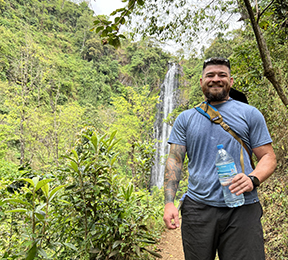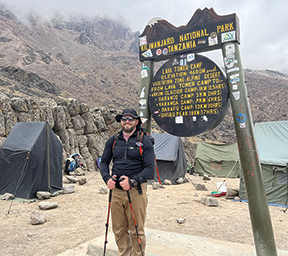Brent Ault has always been a man of action. He wrestled in high school, took combative training as a military police officer in the Army, and adventured in skydiving and mountain climbing. When he took up jiujitsu three years ago, it put him on a path that changed his life.
During a jiujitsu training trip in Costa Rica in January 2021, a slight shift in his position during a roll left him with an odd feeling. “I felt weird all weekend long. I felt like I was a step behind, very sluggish,” Brent said.
When he returned to the United States a week later, he found out that what he thought was a pinched nerve or muscle spasm was something much worse.
Life-Changing Diagnosis
 Brent, who is 36, could still walk but didn’t have full use of his arms and legs. His primary care doctor referred him to North Kansas City Hospital’s Ammar Hawasli, MD, PhD, a board-certified neurosurgeon with Meritas Health Neurosurgery. He diagnosed Brent with an incomplete spinal cord injury, leaving two herniated discs compressing on his spinal cord. The injury disrupted his brain’s ability to send messages below his neck.
Brent, who is 36, could still walk but didn’t have full use of his arms and legs. His primary care doctor referred him to North Kansas City Hospital’s Ammar Hawasli, MD, PhD, a board-certified neurosurgeon with Meritas Health Neurosurgery. He diagnosed Brent with an incomplete spinal cord injury, leaving two herniated discs compressing on his spinal cord. The injury disrupted his brain’s ability to send messages below his neck.
“He needed to have fairly urgent surgery,” Dr. Hawasli said. “We took him to surgery within a few days.”
During a nearly 3-hour surgery, Dr. Hawasli removed the injured discs and fused the bones together to take the pressure off Brent's spine. Once he recovered from the surgery, Brent began an intensive rehabilitation program.
Not Backing Down
Brent embraced the rehab process. After his twice-weekly physical therapy sessions, he put in more work on his own. Brent still had goals he wanted to attain and he didn’t want his injury to stand in the way.
“Before the injury I had the goal of climbing Kilimanjaro and after the injury I thought this is an even better reason to climb it.”
Last October, he climbed Africa’s Mount Kilimanjaro and has his sights set on climbing other mountains including Mount Everest in the Himalayas. Brent would become the first person with an incomplete spinal cord injury to conquer it. He has also resumed his jiujitsu training with hopes of becoming a world champion.
Facing the Challenge
 Brent’s recovery is far from complete and it hasn’t been easy. Right before the injury, he lost his father, who raised him as a single parent. Brent misses his support as he faces new challenges. Brent is still working to have a normal stride when he walks. He also holds onto the wall when he uses the stairs to make sure he doesn’t fall.
Brent’s recovery is far from complete and it hasn’t been easy. Right before the injury, he lost his father, who raised him as a single parent. Brent misses his support as he faces new challenges. Brent is still working to have a normal stride when he walks. He also holds onto the wall when he uses the stairs to make sure he doesn’t fall.
Dr. Hawasli credits Brent’s drive with how far his recovery has progressed.
“Brent was a very positive person. He’s very motivated. He was very goal-oriented. It was clear from the beginning that he would do very well.”
Through it all, Brent never felt sorry for himself. He views it as a challenge. He wants others who have injuries like his to keep their heads up and know there is hope.
“Put the work in," Bent said. "Go through it. Trust the process and know that it is a very slow process.”